- Home
- Jodi Picoult
Mercy
Mercy Read online
MERCY
Jodi Picoult
I'm indebted--again--to Ina Gravitz and Dr. James Umlas. Thanks
also to Fran Kaszuba, Christopher Gentile, Aaron Belz, Laura Gross, Laura Yorke, Jane Picoult, Jon Picoult, and Paul Constantino, chief of police in Sterling, Massachusetts. Hats off to Andrea Greene Goldman, legal guru, who didn't mind consultations at midnight and who graciously waived her hourly fee. And special thanks to my husband, Tim van Leer, who gave me fly-fishing lessons on our perfectly dry back lawn, and all the time I needed to write.
Contents
Part I
One
Two
Three
Four
Five
Six
Seven
Eight
Part II
Nine
Ten
Eleven
Twelve
Thirteen
Fourteen
Fifteen
Sixteen
Part III
Seventeen
Eighteen
Nineteen
Twenty
Twenty-One
Twenty-Two
Twenty-Three
PROLOGUE
When she had packed all the artifacts that made up their personal history into liquor store boxes, the house became strictly a feminine place. She stood with her hands on her hips, stoically accepting the absence of old Boston Celtics coasters and the tangle of fishing poles, the old dartboard from a Scots pub, the toolbox and downhill skis, the silky patterned ties which sat in the base of one box like a writhing mass of snakes. Without these things, one tended to notice the bright eyelet curtains, the vase filled with yawning crocuses, a needlepoint pillow. True, it looked more like a scene from a Martha Stewart magazine than a home, but that was to be expected.
She packed away the matching mugs hand-lettered with their names, and the video camera they'd bought for their last anniversary, and a framed sampler some relative had stitched to commemorate their wedding. She painstakingly dismantled the frame of the big brass bed, lugging the pieces into the living room until all that remained was a thick and silent mattress.
She thanked God, and in advance, the groundhog, for the unseasonably warm day. When it hit 50 degrees in the shallows of January, people came out of their houses, and the more people to venture outside, the more people there would be for the sale. She dragged the boxes outside and turned them over and arranged the items on top of them. She ran a line between the two elm trees in the front yard and neatly hung his clothes up, even his spare and dress uniforms. She emptied his bedroom drawers and organized the things she found in smaller cartons: socks, ten pairs, for fifty cents; sweatshirts, two for a dollar. She set the bed up behind her folding chair, where she wouldn't have to see it.
She went back into the house for a final quick check, since curious neighbors were already milling on the front lawn. The walls were bare of his ancestral paraphernalia. The living room seemed empty, now that his old leather wing chair was sitting in front of the azaleas. Overall, the house looked much like her apartment had eight years ago, before she had met him.
There was only one thing left in the house that reminded her of him. It was the panel of stained-glass, the daffodils on a blue border, that he'd given her just a few months before. She stopped in the bedroom doorway, staring as the sun filtered through it and burned the colors and pattern onto the mattress. When he gave it to her that day, she'd held it up to the light, turning it back and forth, until his hands had come over hers, stilling. "Be careful," he had said. "It's fragile. See the soft lead? It bends. It can break."
She wondered why she had not perceived that conversation then the same way she did now: as a shrill and distant warning. Instead she had only smiled at him, smiled and said that she knew this; that of course, she understood.
Glancing around her, she took a quick calculation of what had sold, what still remained. The strongbox in her lap held over seven hundred dollars at last count; she could easily believe that half of the people in the town had stopped by at some point to browse, if not to buy. The fishing tackle and his grandfather's bamboo fly rod had been among the first things to go. All of his suits were gone. The head teacher at the nursery school had bought every last uniform, saying the four-year-olds loved to play policeman, and wouldn't this be a wonderful addition to the dress-up corner?
The only things left were his boxer shorts--she supposed they would have to be sent to Goodwill--and a stack of travel magazines that she'd found quite by accident behind his band saw. Inspired, she stood up and took the stack, then walked to the edge of the driveway. She handed the one on top---blue ocean, white beach, "200 Top Caribbean Hotels"--to a man with a little girl in tow. "Thank you for stopping by," she said, offering the magazine like a theater Playbill, or a parting gift.
At ten past five, she sat down on her folding chair. She remembered reading once about tribal Indian societies centuries earlier, in which women had the power to divorce a husband simply by stacking his shoes outside a tipi. She pressed her knees together and tried not to think about the sun that was blinding her eyes and giving her a headache.
Her husband drove up at 5:26. "Hi," he said. "I made good time."
She did not say anything.
He glanced at the overturned boxes, the pile of underwear to the left of her feet, the bare strung clothesline, the box on her lap. "Getting rid of some stuff? It was a good day for a garage sale."
She did not turn to face him as he gave her a strange look and walked into the house. She counted how many breaths it took before he thundered down the stairs and out the door, to stand in front of her. His face was red with anger and he blocked out the low sun so that the edges of his hair and his shoulders seemed to be on fire.
"I'm sorry," she said coolly, coming to her feet. She gestured gracefully around the lawn. "There's nothing left." Clutching the strongbox beneath her arm, she walked down the driveway and into the street. She put one foot mechanically in front of the other in the direction she knew would lead to the center of town, and she did not allow herself to look back.
PART I
Who will not mercy unto others show, How can he mercy ever hope to have?
--Edmund Spenser, The Faerie Queene
A man gazing on the stars is proverbially at the mercy of the puddles on the road.
--Alexander Smith, Men of Letters
ONE
In the moments before, she laid a hand on his arm. "No matter what," she said, giving him a look, "you cannot stop." He turned away. "I'm not sure I can even start." She brought his hand to her lips, kissed each finger. "If you don't do it," she said simply, "who will?"
For a long while they sat side by side, staring out a streaked window at a town neither of them knew very well. He watched her breathing pattern in the reflection of the glass, and tried to slow his own heart until they were equally matched. The quiet dulled his senses, so that he became fixated on the clock beside the bed. He would not blink, he told himself, until the next minute bled into the last.
With a fury that surprised him, he turned his face into the bow of her neck, trying to commit to memory this softness and this smell. "I love you." ,.
She smiled, that crooked little curving of her mouth. "Now," she said, "don't you think I know that?"
In the end, she had struggled. He wore the scratches like a brand. But he had held the pillow to her face; calmed her by whispering in her ear. My love, he had said, I'll be with you as soon as I can. At the words her arms had fallen away; then it was over. He had buried his face in her shirt, and started himself the very slow process of dying.
For the hundredth time that day, Cameron MacDonald, Chief of Police in Wheelock, Massachusetts, closed his eyes and dreamed of the Bay of Biscay. If he go
t it just right--the thrum of silence in the station, the afternoon light dancing over the corner of his scarred desk--he could make himself believe. There was no Smith and Wesson jabbing into his side; there was no mountain pass outside the window; hell, maybe he wasn't even Cameron MacDonald anymore. He opened his mind as wide as he could, and let himself tumble into the beautiful blue of it.
He blinked his eyes, expecting the bobbing shoreline of Prest, or the sweet scent of the Loire Valley that you could carry in your pocket when you were within a reasonable distance, but he found himself staring at the pale, pasty face of Hannah, the secretary at the police station. "Here's the file," she said. "He was indicted." She turned to leave, but stopped for a moment with her hand on the door. "You sure you're not coming down with something,
Cam shook his head, as much to clear it as to convince Hannah. He smiled at her, because if he didn't, he knew she'd be on the phone with Allie and within a half hour, his wife would have him drinking a tea made of nettle roots and feverfew.
He put the file down, glancing longingly at Gall's Buying Guide catalog for public safety equipment, inside which he'd stuffed a Travel magazine. Hannah was right--there was something wrong with him. It was the same thing that happened every year since he'd returned to Wheelock, as was expected, to become police chief after his father's death. He was suffering from wanderlust, complicated by the tension of knowing that he was rooted to this town by something as simple as his name.
Wheelock looked like other small western Massachusetts towns:
Wheelock looked like other small western Massachusetts towns: the center consisted of a simple white church and a lending library, a joint building for fire and police, the local coffee shop, and a dotting of old men who sat on stone benches and watched their lives slouch by. But what made Wheelock different from Hancock and Dalton and Williamstown was the fact that had it not been for a twist of fate, nearly every family in Wheelock would still be living in Scotland.
Chief?"
At first you wouldn't notice. But then you'd see that the town restaurant served its specials on "ashets," not plates; that its serviceable stocky white china was decorated with the fat square rose of Bonnie Prince Charlie. You'd attend a marriage at St. Margaret's, and realize that the ceremony still ended with a blood vow. You'd drive through the winding side streets and see the name MAC-DONALD painted on an alarming number of mailboxes.
And if you happened to travel to the Scottish Highlands, you'd notice that a small town called Carrymuir on the banks of Loch Leven was an uncanny twin to Wheelock, Massachusetts.
In the 1700s, the Clan MacDonald was the largest and most powerful clan in Scotland, spread from the western isles through the main Highlands. One particular sect of the clan lived in Carrymuir, a small town north of Glencoe which was nestled between two jagged crags of mountains. In spite of the rampant clan warfare in Scotland, Carrymuir had never been defeated, built as it was in a natural, easily defended fortress.
Clann was the Scottish Gaelic word for children, and a clan was made up of relatives, some more distant than others, who happened to live on a given piece of land. The clan chief, or laird, had the power of life and death over his tenants and tacksmen, but the authority wasn't quite as one-sided as a king's. After all, the chief's subjects were his brothers and nephews and cousins, and the trust and respect they offered up to him came at the price of his protection and his promise to care for them.
Cameron MacDonald of Wheelock, Massachusetts, had been named for his great-great-great-great-great-grandfather, a legendary soldier who had fought in the battle of Culloden, where the English routed the Highlanders. Cameron had heard Che story over and over as a boy:, When his namesake realized that Bonnie Prince Charlie's Highland army didn't stand a chance against the English soldiers, he tried to save his clansmen from being killed in battle. He secured their honorable discharges by promising, in exchange, his own remarkable skill in a fight to the death against the British. But he hadn't died, as he had expected. And after Culloden, when the victorious English came through Scotland burning towns and slaughtering livestock and raping village women, the first Cameron MacDonald realized he had to again save his clan.
So while he went to jail as a Jacobite prisoner, he arranged for the families of Carrymuir to leave, one by one, on packets bound for the American colonies. Which explained why, when most Scots were being hanged or sold as indentured servants to the West Indies, this small sect of Clan MacDonald remained intact and resettled in the wilderness of Massachusetts.
They found a spot that looked like home, with a brace of rolling mountains and a narrow body of water that was more of a pond than a lake, and sent word back to Scotland about this place. Wee loch, they wrote. It's set by a wee loch.
And eventually, the laird and his family came over too, leaving a trusted uncle to watch over the land in Scotland. They traded the comfortable kilt for trousers; they proudly flew the Stars and Stripes; they accepted the Americanized name of the town. And as a natural extension of inbred responsibility, the man who was the figurehead of the Clan MacDonald also became Wheelock's police chief.
In 1995, that position belonged to Cameron MacDonald II, having been handed down from his great-grandfather to his grandfather to his father, passing along the same line of succession as the honorary title of clan chief. He'd be the first to tell you that things had changed. Obviously, although he was considered the chief of a clan and duly noted in the Scottish records, he was no longer directly responsible for the welfare of the townspeople. At least three-quarters of the town had never even seen the lands in Scotland that technically belonged to them. Hardly anyone spoke with a burr; fewer still knew more than a smattering of Gaelic.
On the other hand, old habits died hard. There was no tarnished silver bowl or royal edict that proved that Wheelock was MacDonald land, but it was theirs just the same, in the way that their ancestors had laid claim to that narrow pass in the Scottish Highlands. It was land, quite simply, they'd lived on forever.
At age thirty-five, Cameron MacDonald knew he would stay in Wheelock for the rest of his life; that he would be the police chief until he died and passed the office to his firstborn son. He knew these were things he did not have a choice about, no more than he had a choice about tossing off the choking obligation of being the current laird. Sometimes, in the very still parts of the night, he would tell himself that an honorary title did not mean today what it meant two hundred and fifty years ago. He'd reason that if he picked up his wife and moved to Phoenix for the climate, everyone would take it in stride.
Then he would remember how Darcy MacDonald, his third cousin's daughter, had tripped right on Main Street when Cam was no more than three feet away, talking to the town barber. She'd had seventeen stitches in her knee because he hadn't moved quite fast enough, or been in the right place at the right time. In fact, some days he felt that every arrest, every conviction, was a reflection of something he'd done wrong as a leader.
He'd press up against the soft, snoring curl of his wife, Allie, because she was as solid as any truth he could spin. And he'd try to push himself back into sleep, but his dreams were always of chains, link after link after link, which stretched across the vast Atlantic.
hen Allie Gordon was in high school, she was not the most popular girl in her class. She was nowhere even close. That honor belonged to Verona MacBean, with her cotton-candy puff of hair and her Cover Girl mascara and her pink mohair sweater molded like skin to what the boys referred to as the Hoosac Ridge.
And today, fifteen years out of nowhere, Verona MacBean herself stepped into Glory in the Flower and ordered three large centerpieces for a library luncheon to be given in her name.
"Verona!" Allie had immediately recalled the name. There was something disconcerting about seeing her classmate dressed in a severe beige suit, her hair scraped into a knot at the back of her head, her cheeks flat beneath a sheer layer of foundation. "What brings you to town?"
Verona had made a
little clicking noise with the back of her teeth. "Allie," she said, her voice just as thin and breathy as it had been in high school, "don't tell me you're still here!"
It was not meant as an insult, it never was, so Allie simply shrugged. "Well," she said, drawing out her words and savoring them like a fine French delicacy, "since Cam's here to stay . . ." She let her voice trail off at the end, peeking up at Verona from the order form she was filling out. Then she stared her in the face. "You did hear about Cam and me, didn't you?"
Verona had walked over to the refrigerated case, as if inspecting the quality of the flowers she had already commissioned. "Yes," she said. "I seem to recall something about that."
A few minutes later Verona had left, specifying the exact time for the centerpieces to arrive (it was an author's luncheon; it wouldn't do to have wilted roses for an author who, as she put it, was just coming into bloom). Allie had walked to the back room of the flower shop, where she kept her foam and moss and desiccants, her raffia and wire. She stood in front of the tiny mirror over the bathroom sink, assessing her complexion. Then, rummaging through a bookshelf, she found her high school yearbook---kept solely for putting together names and faces that walked into the shop. She let the book fall open to Verona's page. It was much easier to believe that she, Allie, had grown older and wiser, while Verona MacBean, in glossy black and white, was trapped in time. It did not matter that Verona had gone on to Harvard and then to Yale, that her first book--philosophy-was the talk of the town. It only mattered that in the long run, Allie Gordon had married Cameron MacDonald, which no one in Wheelock would have guessed on a long shot.
On the other hand, it was no great surprise when Verona MacBean became Cameron MacDonald's steady girlfriend in the fall of 1977, although Cameron was a high school senior and Verona was a freshman. They were both undeniably beautiful, Verona in a collectible doll sort of way, and Cam towering over nearly everyone else in the school, his wide, strong shoulders and bright shock of hair always easy to spot.
Allie fell in love with his hair first. She used to sit in the school library bent over a slim volume of Plath's poetry, waiting for him to come through the double glass doors that blocked off the bustle of the hall. He came in every day during the period she worked at the counter checking out books for the grateful, understaffed librarian. She'd straighten the shelves behind the spot where he sat down, imagining her fingers weaving through that hair, separating it so the strands that looked like fire prismed off into reds and rangy yellows. At the end of the class period, she would pick up the books he'd left behind and tuck them back in their Dewey decimal places, trying to hold on to the heat Cam's hands had placed on the protective plastic covers.

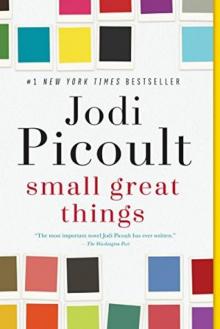 Small Great Things
Small Great Things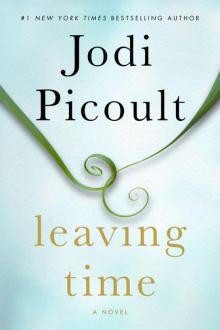 Leaving Time
Leaving Time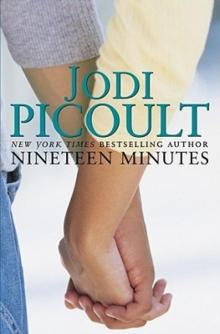 Nineteen Minutes
Nineteen Minutes Larger Than Life
Larger Than Life Perfect Match
Perfect Match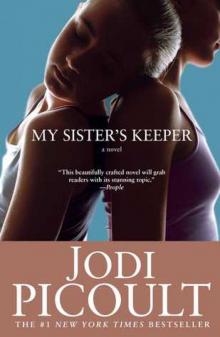 My Sister's Keeper
My Sister's Keeper The Pact
The Pact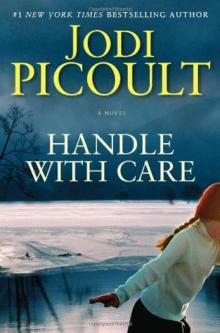 Handle With Care
Handle With Care Songs of the Humpback Whale
Songs of the Humpback Whale Mermaid
Mermaid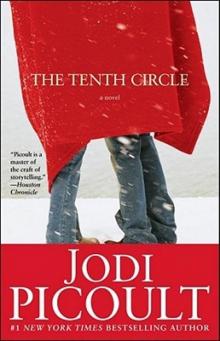 The Tenth Circle
The Tenth Circle The Color War
The Color War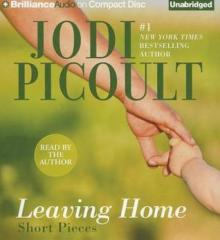 Leaving Home: Short Pieces
Leaving Home: Short Pieces House Rules
House Rules Lone Wolf
Lone Wolf The Storyteller
The Storyteller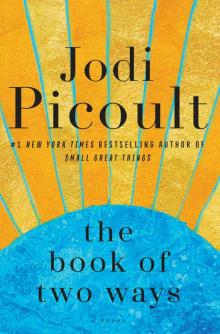 The Book of Two Ways
The Book of Two Ways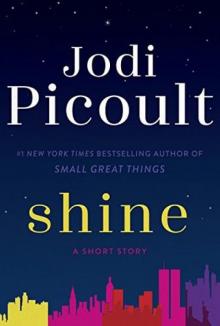 Shine
Shine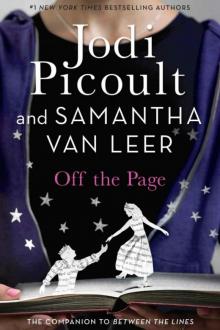 Off the Page
Off the Page Sing You Home
Sing You Home Second Glance: A Novel
Second Glance: A Novel Mercy
Mercy Vanishing Acts
Vanishing Acts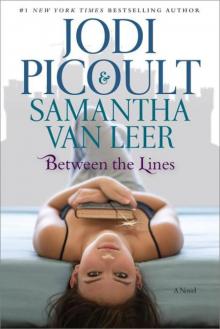 Between the Lines
Between the Lines Plain Truth
Plain Truth Salem Falls
Salem Falls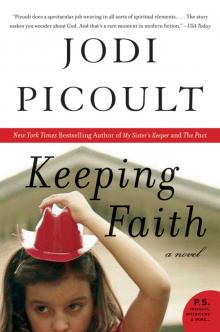 Keeping Faith
Keeping Faith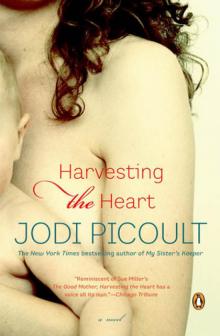 Harvesting the Heart
Harvesting the Heart Change of Heart
Change of Heart Where There's Smoke
Where There's Smoke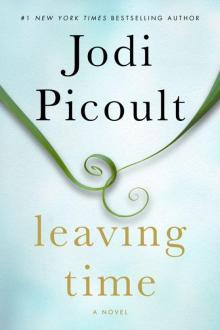 Leaving Time: A Novel
Leaving Time: A Novel Over the Moon
Over the Moon House Rules: A Novel
House Rules: A Novel The Jodi Picoult Collection #2
The Jodi Picoult Collection #2 Leaving Home: Short Pieces (Kindle Single)
Leaving Home: Short Pieces (Kindle Single) My Sister's Keeper: A Novel
My Sister's Keeper: A Novel![Mermaid [Kindle in Motion] (Kindle Single) Read online](http://i1.bookreadfree.com/i1/04/03/mermaid_kindle_in_motion_kindle_single_preview.jpg) Mermaid [Kindle in Motion] (Kindle Single)
Mermaid [Kindle in Motion] (Kindle Single) The Jodi Picoult Collection #4
The Jodi Picoult Collection #4 Sing You Home: A Novel
Sing You Home: A Novel The Jodi Picoult Collection
The Jodi Picoult Collection Lone Wolf A Novel
Lone Wolf A Novel Second Glance
Second Glance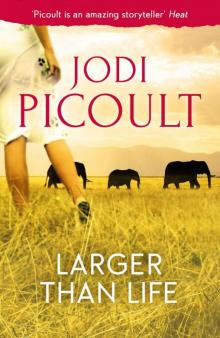 Larger Than Life (Novella)
Larger Than Life (Novella) The Jodi Picoult Collection #3
The Jodi Picoult Collection #3